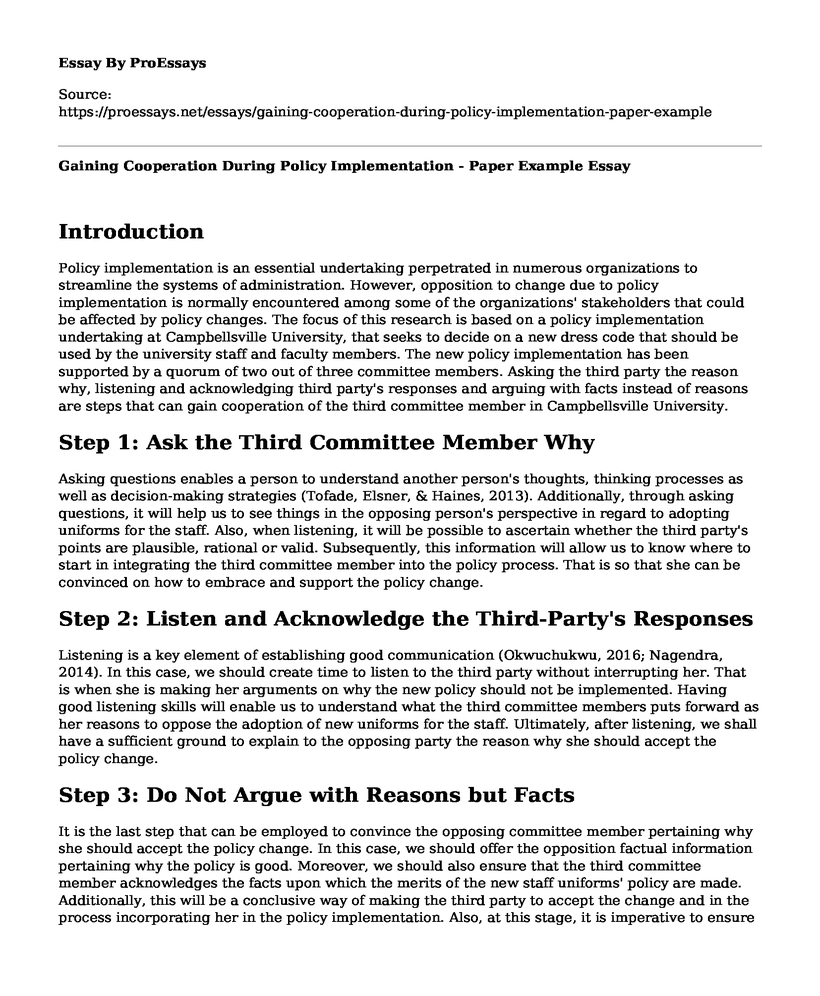Introduction
Policy implementation is an essential undertaking perpetrated in numerous organizations to streamline the systems of administration. However, opposition to change due to policy implementation is normally encountered among some of the organizations' stakeholders that could be affected by policy changes. The focus of this research is based on a policy implementation undertaking at Campbellsville University, that seeks to decide on a new dress code that should be used by the university staff and faculty members. The new policy implementation has been supported by a quorum of two out of three committee members. Asking the third party the reason why, listening and acknowledging third party's responses and arguing with facts instead of reasons are steps that can gain cooperation of the third committee member in Campbellsville University.
Step 1: Ask the Third Committee Member Why
Asking questions enables a person to understand another person's thoughts, thinking processes as well as decision-making strategies (Tofade, Elsner, & Haines, 2013). Additionally, through asking questions, it will help us to see things in the opposing person's perspective in regard to adopting uniforms for the staff. Also, when listening, it will be possible to ascertain whether the third party's points are plausible, rational or valid. Subsequently, this information will allow us to know where to start in integrating the third committee member into the policy process. That is so that she can be convinced on how to embrace and support the policy change.
Step 2: Listen and Acknowledge the Third-Party's Responses
Listening is a key element of establishing good communication (Okwuchukwu, 2016; Nagendra, 2014). In this case, we should create time to listen to the third party without interrupting her. That is when she is making her arguments on why the new policy should not be implemented. Having good listening skills will enable us to understand what the third committee members puts forward as her reasons to oppose the adoption of new uniforms for the staff. Ultimately, after listening, we shall have a sufficient ground to explain to the opposing party the reason why she should accept the policy change.
Step 3: Do Not Argue with Reasons but Facts
It is the last step that can be employed to convince the opposing committee member pertaining why she should accept the policy change. In this case, we should offer the opposition factual information pertaining why the policy is good. Moreover, we should also ensure that the third committee member acknowledges the facts upon which the merits of the new staff uniforms' policy are made. Additionally, this will be a conclusive way of making the third party to accept the change and in the process incorporating her in the policy implementation. Also, at this stage, it is imperative to ensure that the committee member acknowledges his compliance to the new policy based on the presented facts to ensure that we are on the same page.
Conclusion
In conclusion, asking the third party the reason why, listening and acknowledging her responses and arguing with facts instead of reasons are steps that can gain cooperation of the third committee member in Campbellsville University. That is in regards to developing new uniforms for the university staff and faculty members. Through asking the question why, it will be possible to know why the third party is opposed to the policy change. Second, listening and acknowledging the opposing party's reasons will help understand her reasons for opposition to the policy change. Lastly, arguing with facts is the best strategy that can be employed to convince the opposing committee member of the need for policy change. That is because factual statements are conclusive and unalterable.
References
Nagendra, K. (2014). Listening As a Basic Skill of Communication. Journal of Business Management & Social Sciences Research (JBM&SSR), 3(4), 31-32.
Okwuchukwu, C. L. (2016). Listening for Effective Communication: A Study of Undergraduates of Nnamdi Azikiwe University, Awka. Mgbakoigba, Journal of African Studies, 6(1), 1-5.
Tofade, T., Elsner, J., & Haines, S. T. (2013). Best Practice Strategies for Effective Use of Questions as a Teaching Tool. American Journal of Pharmaceutical Education, 77(7), 155. doi:10.5688/ajpe777155
Cite this page
Gaining Cooperation During Policy Implementation - Paper Example. (2022, Jul 21). Retrieved from https://proessays.net/essays/gaining-cooperation-during-policy-implementation-paper-example
If you are the original author of this essay and no longer wish to have it published on the ProEssays website, please click below to request its removal:
- Directional Strategies
- The Business Context Analysis on Example of Apple
- Communications and Emotional Intelligence Essay
- Incident Response Plan Paper Example
- Paper Example on Chiquita's Struggles: Mass Production of Bananas in Colombia
- Team Structures: Enhancing Creativity and Innovation for Market Success - Essay Sample
- Case Study Sample on Ethical Decision-Making: Models to Guide Critical Thinking







